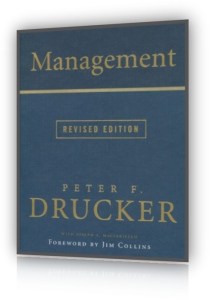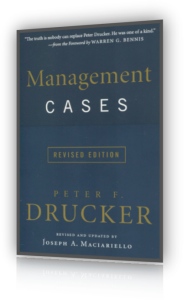

Amazon Links: Management Rev Ed and Management Cases, Revised Edition
and Management Cases, Revised Edition
See contents of Management Cases, Revised Edition
Each member of the enterprise contributes something different, but all must contribute toward a common goal.
Their efforts must all pull in the same direction, and their contributions must fit together to produce a whole—without gaps, without friction, without unnecessary duplication of effort.
Every job in the company must be directed toward the objectives of the whole organization if the overall goals are to be achieved.
In particular, each manager's job must be focused on the success of the whole.
The performance that is expected of managers must be directed toward the performance goals of the business.
Results are measured by the contribution they make to the success of the enterprise.
Managers must know and understand what the business goals demand of them in terms of performance, and their superiors must know what contribution to demand and expect.
If these requirements are not met, managers are misdirected and their efforts are wasted.
Management by objectives requires major effort and special techniques.
In a business enterprise managers are not automatically directed toward a common goal.
On the contrary, organization, by its very nature, contains four factors that tend to misdirect:
 the specialized work of most managers
the specialized work of most managers
 the hierarchical structure of management
the hierarchical structure of management
 the differences in vision and work and the resultant isolation of various levels of management
the differences in vision and work and the resultant isolation of various levels of management
 the compensation structure of the management group
the compensation structure of the management group
To overcome these obstacles requires more than good intentions.
It requires policy and structure.
It requires that management by objectives be purposefully organized and be made the living law of the entire management group.
The Specialized Work Of Managers
An old story tells of three stonecutters who were asked what they were doing.
The first replied, "I am making a living."
The second kept on hammering while he said, "I am doing the best job of stone-cutting in the entire country."
The third one looked up with a visionary gleam in his eyes and said, "I am building a cathedral."
The third man is, of course, the true manager.
The first man knows what he wants to get out of the work and manages to do so.
He is likely to give a "fair day's work for a fair day's pay."
But he is not a manager and will never be one.
It is the second man who is the problem.
Workmanship is essential—an organization demoralizes if it does not demand of its members the highest workmanship they are capable of.
But there is always a danger that the true workman, the true professional, will believe that he is accomplishing something when, in effect, he is just polishing stones or collecting footnotes.
Workmanship must be encouraged in the business enterprise.
But it must always be related to the needs of the whole.
Most managers and career professionals in any business enterprise are, like the second man, concerned with specialized work.
A person's habits as a manager, his vision and values, are usually formed while he does functional and specialized work.
It is essential that the functional specialist develop high standards of workmanship, that he strive to be "the best stonecutter in the country."
For work without high standards is dishonest; it corrupts the worker and those around him.
Emphasis on, and drive for, workmanship produces innovations and advances in every area of management.
That managers strive to do the best job possible—to do "professional human resource management," to run "the most up-to-date plant," to do "truly scientific market research" must be encouraged.
But this striving for professional workmanship in functional and specialized work is also a danger.
It tends to divert the manager's vision and efforts from the goals of the business.
The functional work becomes an end in itself.
In far too many instances the functional managers no longer measure their performance by its contribution to the enterprise but only by professional criteria of workmanship.
They tend to appraise subordinates by their craftsmanship and to reward and to promote them accordingly.
They resent demands made for the sake of organizational performance as interference with "good engineering," "smooth production," or "hard-hitting selling."
The functional manager's legitimate desire for workmanship can become a force that tears the enterprise apart and converts it into a loose association of working groups.
Each group is concerned only with its own craft.
Each jealously guards its own "secrets."
Each is bent on enlarging its own domain rather than on building the business.
The remedy is to counterbalance the concern for craftsmanship with concern for the common goal of the enterprise.


![]()